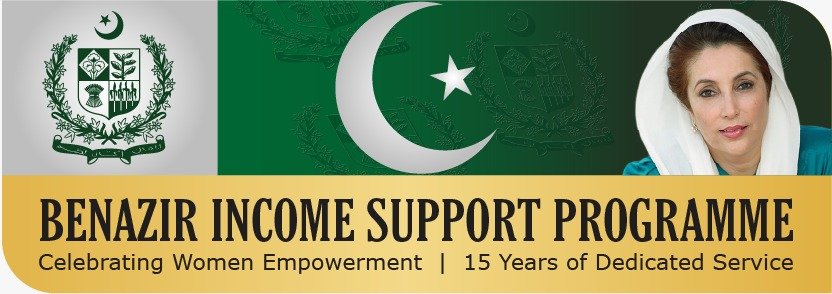Introduction
BISP established National Socio-Economic Registry (NSER) in 2011. NSER is a data repository containing information on the Benazir National Socio Economic Registry status of all households (HHs) participating in the data collection exercise. In 2010, data was collected from 27 million HHs by going to the doorsteps of every household in the country for the first time. NSER acted as a platform for all social security programs in the public and private sectors to improve overall targeting efficiency during implementation. BISP and other social security programs have been using this data set for the past ten years.
In 2016, BISP decided to update the NSER 2011 survey design and questionnaire, which in turn updated the registry database to improve the targeting efficiency of BISP and other programs using the registry. done The purpose of the NSER update was to revalidate existing beneficiaries, enroll new beneficiaries in the program, and serve as a platform for other social security programs. Important data was collected in the field during 2019-2021. BISP has now completed updating NSER through which data of 35 million HHs has been collected. All eligible HHs falling under the prescribed eligibility limits are now participating in the program to avail the benefits.

Today, BISP has the largest socio-economic database of all HHS in Pakistan, an output of NSER survey based on scientifically designed Computer Assisted Personal Interview (CAPI). Apart from BISP’s targeted unconditional and conditional cash transfer program components, which use registry data, it is also being used to plan various poverty alleviation and social protection policies and programs. The latest data is being shared under data-sharing protocols with various international and national organizations for research, program design, and implementation purposes.
After a static registry update, NSER is now moving to a dynamic registry platform that allows for relatively frequent updates to existing data and open and continuous access to new registrations for the public. NSER, through a Multi-Entry Localized Access (MELA) framework, implements a dynamic registry through the nationwide presence of registration centers at the highest levels, with access to verification and authentication of the National Citizen Registry managed by NADRA. is The registry has a mechanism to act as a shock-absorbing registry that allows capturing changes in the socio-economic conditions of disaster-affected areas.
Beneficiaries of NSER Survey
The Benazir National Socio-Economic Registry (NSER) survey offers many benefits to both citizens and government agencies in Pakistan. Here are some key benefits:
- Data for Planning and Development
- Better targeting of social programs
- A platform for other initiatives
- Efficiency and Transparency
- Potential for wider use
How does NSER work
The National Socio-Economic Registry (NSER) in Pakistan works in several stages:
Data Collection
Initially, a significant effort was made to collect data from almost all the households in the country. This included door-to-door surveys by prospectively trained staff.
Data Storage
Collected information is stored in a central registry. This registry contains details about the socioeconomic status of the household, including income, living conditions, and household members.
Data Updates
NSER is not a fixed record. Systems are in place to update the data from time to time. This could include new surveys, online portals for self-reporting changes, or verification through national databases such as NADRA (National Database and Registration Authority).
Beneficiary Targeting
Social security programs like the Benazir Income Support Program (BISP) rely on NSER data to identify eligible beneficiaries. The data allows them to target those most in need based on predetermined criteria.
Transparency and Validation
To ensure accuracy and equity, NSER data undergoes a verification process. This may include checking against other records or independent verification by a third party.
Who is Eligible for the NSER Survey
The NSER survey itself does not determine eligibility for social programs. Instead, the data it collects is used to calculate scores on the Proxy Means Test (PMT), which determines whether a household qualifies for various BISP programs such as the Ehsaas program. Is it or not?
Here is an overview of factors that commonly affect eligibility for BISP programs based on NSER data:
Income Level
Households scoring below a certain threshold on the PMT (usually around 40%) are considered for benefits. This limit translates into a monthly income limit, although the exact figure may vary.
Owning assets
Owning expensive assets like cars or excessive real estate can negatively impact your PMT score.
Disability Status
Households with disabled members may be eligible for additional benefits or score higher on the PMT.
Government Job
If a member of the household holds a government position, this may affect the eligibility.
Documents Required for NSER Registration
BISP selects households for a survey to update NSER. However, if you are contacted for an NSER survey, here are the documents you will need to have available.
CNIC
This is the primary identification document required for most government services in Pakistan.
Proof of Residence
This can include utility bills (electricity, water, gas) or a house registration certificate in your name or a family member’s name.
Income Certificate
Depending on the specific survey, they may request an income certificate as verification. It is optional
Family Registration Certificate
In some cases, they may ask for a family registration certificate to verify household information. It is optional
NSER Registration Form Online
There are two ways to register online for the NSER survey:
Online Portal
- Visit the official site of Ehsaas Online Application and find the NSER Registration link.
- Enter your correct information including CNIC number, contact, and income details of all household members.
NADRA Service Centers
Visit your nearest NADRA office with your CNIC. The staff will assist you in filling out the NSER registration form.
NSER Survey Registration Check through CNIC
You can check your registration with CNIC online by following these steps:
- Enter your CNIC number and send it to 8171.
- Submit the form and then you will receive a reply.
- If you are not eligible they will send you a message like (Your record does not exist).
NSER Check Balance
Follow these steps to check NSER balance details:
- Send your ID card to 8171.
- Visit the nearest BISP center, BISP official site, and NSER NADRA Govt PK site.
- Contact BISP helpline number 0800-26477.
All these steps can help you know your balance details.
FAQ’s
1. What is the purpose of the NSER survey?
The NSER survey aims to create a comprehensive socio-economic profile of Pakistan by collecting data from households. This data is used to identify beneficiaries and improve targeting for social programs.
2. How to check eligibility for the NSER survey?
You can check eligibility by sending your CNIC number to 8171 then you will get information about your eligibility status.
3. What is the helpline number of BISP?
0800-26477 is the helpline number of BISP. You can contact them for any guidance and details.
Conclusion
The National Socio-Economic Registry (NSER) is like a giant record book for Pakistani households. It contains information on millions of families, including their income, housing, and ownership. This information helps the government decide who needs the most help. Social programs can then target these families for things like cash assistance or scholarships. NSER also helps the government to better understand poverty in Pakistan so that it can develop better programs in the future.

